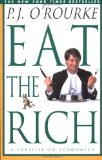Summary | Excerpt | Reviews | Readalikes | Genres & Themes | Author Bio

A Treatise on Economics
by P.J. O'Rourke
Samuelson's foreword to the fifteenth edition says, "In the reactionary
days of Senator Joseph McCarthy ... my book got its share of condemnation."
I should think so. Economics is full of passages indicating that
Samuelson (if not William-come-lately Nordhaus) disagrees with that reactionary
idea, the free market. The chapter titled "Applications of Supply and
Demand" states, "... crop restrictions not only raise the price of
corn and other crops but also tend to raise farmers' total revenues and
earnings." Increase your corn profit by not growing corn? Here's a
wonderful kind of business where everybody can get rich if they'll just do
nothing.
In the chapter "Supply and Allocation in Competitive Markets," the
book seems to be confused about the very nature of buying and selling. "Is
society satisfied with outcomes where the maximal amount of bread is
produced," it asks, "or will modern democracies take loaves from the
wealthy and pass them out to the poor?" Are the rich people just going to
keep those loaves to grow mold? Why would they produce "the maximal amount
of bread" to do that? Or are we talking about charity here? If so, let us
note that Jesus did not perform the miracle of the loaves and taxes. We all know
how "modern democracies take loaves from the wealthy." It's the
slipups in the "pass them out to the poor" department that inspire a
study of Econ.
It was not reassuring to learn that the men who run the companies where our
401(k)s are invested have minds filled with junk from the attic of Paul A.
Samuelson's Economics.
There were newer texts than Economics for me to look at, and what they
said wasn't so obviously wrong. But then again, what they said wasn't so
obvious, period. Here are the first three sentences of Macro-economics by
David C. Colander (donated by Eric Owens, who lives next door to me and is
taking Econ at the University of New Hampshire): "When an artist looks at
the world, he sees color. When a musician looks at the world, she hears music.
When an economist looks at the world, she sees a symphony of costs and
benefits." Somebody change the CD, please.
The textbooks weren't good. This sent me to the original source material, the
classics of economic thought. But here I had to admit, as I was tacitly
admitting thirty years ago, that I don't have the brains to be a Tri-Delt. The
Wealth of Nations, Das Kapital, The General Theory of Whatchmacallit were
impressive works and looked swell on my bookshelf, but they put me to sleep
faster than the economic news of the '70s had.
There were, of course, popular books on economics, but the really popular
books were about extraordinary people doing extraordinary things and getting
fabulously wealthy or going to jail--preferably both. I was interested in
ordinary people doing ordinary things and getting by. And the less popular but
more worthwhile books on economics all seemed to presume that I'd made it
through something like Economics without blowing a fuse.
So I gave up trying to be smart about economics. I decided that if I wanted
to know why some places were rich and other places were poor, I should go to
those places. I would visit different economic systems: free market, socialist,
and systems nobody could figure out. I'd look at economically successful
societies: the U.S., Sweden, Hong Kong. I'd look at economically unsuccessful
societies: Albania, Cuba, Tanzania. And I'd look at societies that hadn't
decided whether to be successful or not: Russia and mainland China. I'd wander
around, gape at things, and simply ask people, "Why are you so broke?
From Eat the Rich, by P. J. O'Rourke. © September 1998 , P. J. O'Rourke. Used by permission.






Your guide toexceptional books
BookBrowse seeks out and recommends the best in contemporary fiction and nonfiction—books that not only engage and entertain but also deepen our understanding of ourselves and the world around us.